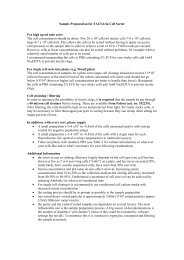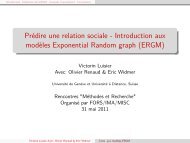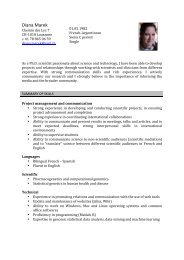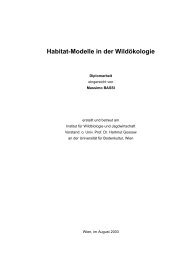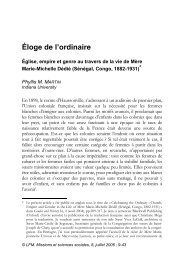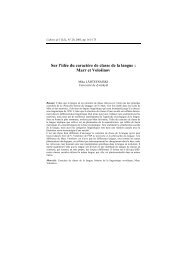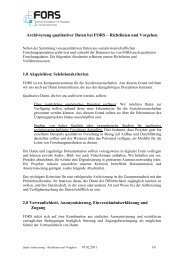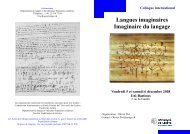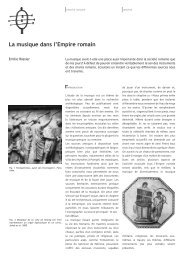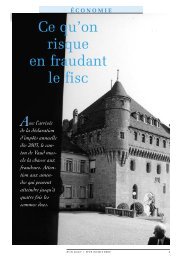conference programme book - European Survey Research ...
conference programme book - European Survey Research ...
conference programme book - European Survey Research ...
You also want an ePaper? Increase the reach of your titles
YUMPU automatically turns print PDFs into web optimized ePapers that Google loves.
124 THURSDAY 21 JULY1 Erasmus University, NetherlandsWeb-surveys are disadvantageous for self-idenficaon of occupaon because unidenfiable and too aggregateresponses can’t be corrected during survey compleon. Therefore, stascal agencies judge the measurementof the occupaon variable in web-surveys too risky. Two soluons are discussed: online text stringmatching and a search tree, both using an occupaonal database. The laer is commonly used by onlinejobsites, the former not well developed today.3.7.3 The standardizaon of background variables related to occupaon in the ISSPJ. Edlund 1 , I. Bechert 21 Department of Sociology, University of Umea, Sweden; 2 GESIS - Leibniz Instute for the Social Sciences, GermanyThe Internaonal Social <strong>Survey</strong> Program (ISSP) is one of the most used data bases among scholars involved incross-naonal research. The program originally started out as a collaborave item exchange project, focusingmostly on the measurement equivalence of atudinal items. Less effort was put on creang standardizedmeasurements of key sociological background variables, such as those related to the labor market, e.g., occupaon,sector, and labor market status. With the growth of the ISSP – at present more than 40 countriesare involved – the less than opmal standardizaon of background variables created increasing problems forscholars. Some years ago, the ISSP set up a task force, the Demographic Methods Group (DMG) addressingthese problems. In 2009, the ISSP implemented the work by the DMG and started changing the measurementof background variables in order to improve standardizaon...3.7.4 Occupaon as a key survey variable: concepts, measurement, coding methods and accuracyP. Elias 11 Insiitute for Employment <strong>Research</strong>, University of Warwick, United KingdomThis presentaon reviews progress that has been made over the last 20 years towards improving the quality ofinformaon on occupaons as collected in censuses and surveys. The author draws on his experience in developingthree UK naonal occupaonal classificaons (SOC90, SOC2000 and SOC2010), together with the workhe has performed for the Internaonal Labour Office and Eurostat to help develop a harmonised classiifciaonof occupataons for use within the <strong>European</strong> <strong>Research</strong> Area. The presentaon will cover conceptual issues,procedures for the collecon of occupaonal informaon, coding problems, the use of soware for coding. Itconcludes with an assessment of the current quality of occupaonal informaon in a variety of survey sources.3.8 Internet panels for the general populaon: Fact or ficon IIITo be held on July 21, 2011 from: 09:00 to 10:30, in room 412.Coordinated by:• Edith De Leeuw - University of Utrecht, Netherlands• Annee Scherpenzeel - CentERdata, Netherlands3.8.1 Are reluctant panelists worth the effort? Analysis of measurement error in a probability-based Internetpanel.C. Roberts 3 , P. Sturgis 1 , N. Allum 21 University of Southampton, United Kingdom; 2 University of Essex, United Kingdom; 3 University of Lausanne,SwitzerlandInternet panel surveys based on probability samples of the populaon present new and excing opportuni-es for gathering social science data. Yet despite their considerable appeal, parcularly with respect to measurementquality (for example, the potenal to reduce bias on socially sensive quesons, the avoidance of



